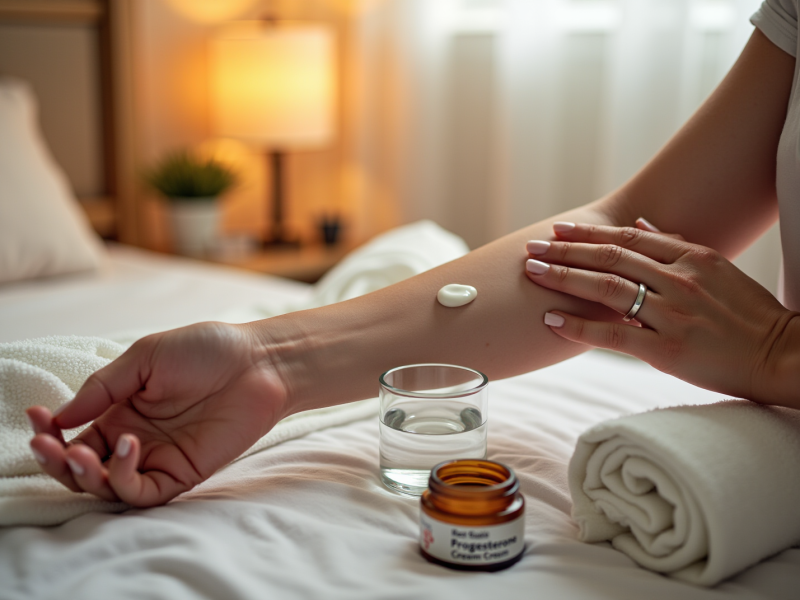Overview
Progesterone cream, bioidentical in nature, provides significant benefits for women undergoing menopause. It alleviates common symptoms such as hot flashes, mood swings, and sleep disturbances, while also promoting overall health. This article details how the cream effectively regulates hormonal balance, enhances skin health, and reduces the risk of endometrial cancer. As a result, it becomes a vital component of hormone replacement therapy during this transitional phase.
Introduction
Navigating the tumultuous waters of menopause can be challenging, as women often face a barrage of symptoms, including hot flashes and mood swings. Amidst this hormonal upheaval, progesterone cream bioidentical emerges as a promising option, offering symptom relief and a pathway to enhanced overall well-being.
However, the decision to incorporate this therapy raises critical questions regarding its safety, effectiveness, and the nuances between natural and synthetic options. Understanding the true benefits of progesterone cream is essential, as is knowing how to use it safely to reclaim balance during this pivotal life stage.
Define Progesterone and Its Role in Women’s Health
Progesterone cream bioidentical, a steroid hormone primarily produced in the ovaries, is essential for regulating the menstrual cycle and sustaining pregnancy. As women transition into menopause, there is a significant decrease in hormone levels, leading to various effects such as hot flashes, mood swings, and sleep disturbances. This hormonal shift highlights the importance of maintaining hormonal balance during this critical life phase. Beyond addressing these symptoms, progesterone plays a vital role in promoting bone health, enhancing skin elasticity, and stabilizing mood—factors that are crucial for the overall well-being of those experiencing menopause.
Experts emphasize that hormone therapy, such as progesterone cream bioidentical, can effectively alleviate distressing symptoms, making it a key component of hormone replacement treatment. Research indicates that daily oral hormones can reduce the occurrence and severity of hot flashes and night sweats, providing considerable relief for many individuals, as illustrated by the case study titled “Effects of Hormones on Menopausal Symptoms.” Furthermore, gynecologists advocate for the use of progesterone cream bioidentical to protect against endometrial cancer, particularly in individuals who still have their uterus.
Dr. JoAnn Manson, a leading researcher in female health, suggests that clinicians should ‘very seriously consider’ hormone therapy for individuals within ten years of reaching menopause or before age 60, provided there are no contraindications. Therefore, understanding the diverse is crucial for those navigating the complexities of menopause. However, it is essential to consult healthcare professionals regarding the risks and benefits of this therapy to ensure a safe and effective approach.
Differentiate Between Natural and Synthetic Progesterone
Natural hormones, including progesterone cream bioidentical, are derived from plant sources such as yam or soy and are chemically identical to the substances produced by the body. This similarity makes progesterone cream bioidentical a popular option for many women undergoing hormone replacement therapy (HRT) during menopause. In contrast, synthetic progestin is a laboratory-created hormone that mimics some effects of natural hormones but can lead to different side effects, including an increased risk of blood clots, heart disease, and breast cancer. Research indicates that natural hormones may lower breast cancer risk by 29% over 20 years, while synthetic progestins have been linked to greater risks.
Common brand names of natural hormones include Utrogestan and Cyclogest, which are frequently recommended for their efficacy. Women utilizing natural hormones often report significant such as hot flashes and sleep disturbances. A study found that taking 300 mg of a specific hormone daily at bedtime improved deep sleep quality without inducing depressive symptoms, highlighting its potential benefits beyond mere symptom relief. Experts in the field, including medical oncologists, emphasize that natural hormone replacement therapies like progesterone cream bioidentical are safe and effective, particularly when initiated early in menopause. They advocate for tailored discussions between individuals and their healthcare providers to assess the risks and benefits of various treatments.
Experts generally agree that using progesterone cream bioidentical and other natural hormones is safer for HRT, as they assist in maintaining a thin uterine lining, thereby lowering the risk of endometrial cancer. This safety profile, combined with their efficacy in alleviating menopausal symptoms, positions natural hormones as a beneficial choice for individuals seeking to manage their health during this transitional phase. Furthermore, for individuals who have undergone a hysterectomy, natural hormones can still provide systemic advantages, making them a versatile option in hormone management.
Explore Benefits of Bioidentical Progesterone Cream for Menopause Relief
Bioidentical hormone treatment provides significant comfort for individuals experiencing menopause, effectively alleviating issues such as hot flashes, night sweats, and mood fluctuations. Many users report a notable improvement in sleep quality and a decrease in anxiety levels. Research indicates that approximately 70% of women utilizing find relief from menopause-related issues, underscoring its effectiveness.
In addition to symptom management, this topical treatment promotes skin health by enhancing elasticity and reducing wrinkles, which may be negatively impacted by hormonal changes. Furthermore, bioidentical hormone lotion is associated with a lower risk of endometrial cancer, making it a safer alternative among hormone therapy options.
Overall, the use of bioidentical hormone lotion can greatly enhance the quality of life for menopausal women, allowing them to navigate this transitional phase with increased ease and comfort.
Guide to Proper Application and Dosage of Progesterone Cream
To achieve optimal results with progesterone cream bioidentical, it is crucial to apply it correctly. The cream should be applied to clean, dry skin on areas with good blood flow, such as the inner arms, thighs, or abdomen. A common dosage is 20-40 mg per day, typically applied in divided doses (morning and evening), with a recommended frequency of 2-3 times daily for menopausal women. Furthermore, it’s important to rotate application sites to avoid skin irritation. Women should to determine the appropriate dosage based on their individual needs and symptoms, as well as to evaluate health concerns and hormone levels.
Consistency in the application of progesterone cream bioidentical is key to experiencing its full benefits. Additionally, it is essential to be aware of the potential side effects of synthetic hormones, which can include breast tenderness and mood changes. As Dr. Jolene Brighten emphasizes, “When used incorrectly, this hormone can suppress ovulation and you could be doing more harm than good in these conditions.” Therefore, consulting a healthcare provider before beginning hormone therapy is crucial to ensure safe and effective use.
Identify Precautions and Side Effects of Progesterone Cream
While can provide substantial advantages for addressing menopause symptoms, it is essential to understand possible side effects and required precautions. Common side effects include:
- Breast tenderness
- Headaches
- Mood changes
- Bloating
Women with a history of breast cancer, blood clots, or other serious conditions should consult their healthcare provider before using hormone cream, as it may worsen existing health issues. Furthermore, research suggests that hormone therapy can elevate the likelihood of breast cancer and blood clotting issues; for example, synthetic hormones may result in severe side effects like heightened risk of heart attacks and strokes. Monitoring for unusual symptoms is vital, and any adverse effects should be promptly reported to a healthcare professional. As Dr. Culwell highlights, “It’s advisable to consult with a health care professional before trying the hormonal topical treatment.” By understanding these precautions, women can utilize bioidentical progesterone cream safely and effectively as part of their menopause management strategy.
Conclusion
The exploration of progesterone cream bioidentical reveals its vital role in managing menopause symptoms and promoting overall health for women during this transitional phase. As hormone levels fluctuate significantly, utilizing bioidentical progesterone can help restore balance and alleviate distressing symptoms, thereby enhancing quality of life.
Key insights from the article highlight the importance of understanding the differences between natural and synthetic progesterone, with a clear preference for bioidentical options due to their safety and efficacy. The benefits range from symptom relief—such as reduced hot flashes and improved sleep quality—to long-term health advantages, including lower risks of endometrial cancer. Proper application and dosage are crucial to maximizing these benefits, and consulting healthcare professionals remains essential for tailored treatment.
Ultimately, embracing the use of bioidentical progesterone cream presents a proactive approach to managing menopause. Women are encouraged to engage in informed discussions with their healthcare providers to navigate this journey effectively, ensuring they can harness the full potential of hormone therapy for a healthier, more comfortable experience during menopause.
Frequently Asked Questions
What is progesterone and what role does it play in women’s health?
Progesterone is a steroid hormone primarily produced in the ovaries, essential for regulating the menstrual cycle and sustaining pregnancy. It also plays a vital role in promoting bone health, enhancing skin elasticity, and stabilizing mood, particularly during menopause.
How does menopause affect hormone levels and what symptoms may arise?
During menopause, there is a significant decrease in hormone levels, leading to symptoms such as hot flashes, mood swings, and sleep disturbances. Maintaining hormonal balance is crucial during this transition.
How can progesterone therapy help alleviate menopausal symptoms?
Hormone therapy, including progesterone cream bioidentical, can effectively alleviate distressing menopausal symptoms like hot flashes and night sweats. Research indicates that daily oral hormones can reduce the occurrence and severity of these symptoms.
What is the difference between natural and synthetic progesterone?
Natural progesterone, such as progesterone cream bioidentical, is derived from plant sources and is chemically identical to the hormones produced by the body. Synthetic progestin, on the other hand, is laboratory-created and can lead to different side effects, including an increased risk of blood clots, heart disease, and breast cancer.
What are the benefits of using natural hormones for hormone replacement therapy (HRT)?
Natural hormones may lower breast cancer risk and provide significant relief from menopausal symptoms. They assist in maintaining a thin uterine lining, thereby lowering the risk of endometrial cancer, making them a safer option for HRT.
What do experts recommend regarding hormone therapy for women nearing menopause?
Experts suggest that clinicians should consider hormone therapy for individuals within ten years of reaching menopause or before age 60, as long as there are no contraindications. It’s important to consult healthcare professionals regarding the risks and benefits of this therapy.
Are there any specific studies that highlight the efficacy of natural hormones?
Yes, studies indicate that taking 300 mg of a specific natural hormone daily at bedtime can improve deep sleep quality without inducing depressive symptoms, showcasing its potential benefits beyond symptom relief.
What are some common brand names of natural progesterone?
Common brand names of natural hormones include Utrogestan and Cyclogest, which are frequently recommended for their efficacy in managing menopausal symptoms.
List of Sources
- Define Progesterone and Its Role in Women’s Health
- Hormones for menopause are safe, study finds. Here’s what changed (https://npr.org/sections/health-shots/2024/05/01/1248525256/hormones-menopause-hormone-therapy-hot-flashes)
- The new science of menopause: these emerging therapies could change women’s health (https://nature.com/articles/d41586-025-00069-4)
- Menopause Hormone Therapy is Making a Comeback: Is it Safe and Right for You? | (https://longevity.stanford.edu/lifestyle/2025/03/06/menopause-hormone-therapy-is-making-a-comeback-is-it-safe-and-right-for-you)
- Should Women Take Hormones to Manage Menopause? (https://magazine.ucsf.edu/should-women-take-hormones-manage-menopause)
- Progesterone for Menopause Symptoms: Benefits and Side Effects (https://healthline.com/health/progesterone-for-menopause)
- Differentiate Between Natural and Synthetic Progesterone
- Weill Cornell Researcher Shows How Progesterone Is Not Just Sex Hormone but Blood Pressure Hormone | NYP (https://nyp.org/news/researcher-shows-progesterone-is-sex-and-blood-pressure-hormone)
- Progesterone for Menopause Symptoms: Benefits and Side Effects (https://healthline.com/health/progesterone-for-menopause)
- Progesterone vs. synthetic progestins and the risk of breast cancer: a systematic review and meta-analysis – PMC (https://pmc.ncbi.nlm.nih.gov/articles/PMC4960754)
- Synthetic and natural hormones: what’s the difference? (https://drlouisenewson.co.uk/knowledge/synthetic-and-natural-hormones-whats-the-difference)
- Is Hormone Replacement Therapy Safe? Pros and Cons of HRT (https://cancercenter.com/community/blog/2024/09/is-hormone-replacement-therapy-safe)
- Explore Benefits of Bioidentical Progesterone Cream for Menopause Relief
- New attitudes and new treatments help women with menopause (https://web.musc.edu/about/news-center/2024/11/25/new-attitudes-and-new-treatments-help-women-with-menopause)
- Hormones for menopause are safe, study finds. Here’s what changed (https://npr.org/sections/health-shots/2024/05/01/1248525256/hormones-menopause-hormone-therapy-hot-flashes)
- Menopause Hormone Therapy is Making a Comeback: Is it Safe and Right for You? | (https://longevity.stanford.edu/lifestyle/2025/03/06/menopause-hormone-therapy-is-making-a-comeback-is-it-safe-and-right-for-you)
- Progesterone for Menopause Symptoms: Benefits and Side Effects (https://healthline.com/health/progesterone-for-menopause)
- Guide to Proper Application and Dosage of Progesterone Cream
- Natural Progesterone Cream for Infertility, Menopause & More (https://draxe.com/health/progesterone-cream)
- Is Progesterone Cream the Answer for Hormone Imbalance? (https://drbrighten.com/is-progesterone-cream-the-answer-for-hormone-imbalance)
- How to Use Progesterone Cream & Why You Should Consider It – Reasons To Use Progesterone Cream – Proov (https://proovtest.com/blogs/blog/how-to-use-progesterone-cream?srsltid=AfmBOorDAK_kyMrzjVkL4Z9gCdnVZuqsWmBmCoPwOjAj1WS9eLrmsQXn)
- Frequently Asked Questions: How to Apply Estrogen and Progesterone Topical Creams | Total Health ND | Naturopathic Doctor In London (https://totalhealthnd.com/faq-estrogen-and-progesterone-topical-creams)
- Identify Precautions and Side Effects of Progesterone Cream
- Natural Progesterone Cream for Infertility, Menopause & More (https://draxe.com/health/progesterone-cream)
- Progesterone for Menopause Symptoms: Benefits and Side Effects (https://healthline.com/health/progesterone-for-menopause)
- Progesterone: Uses and Risks (https://webmd.com/vitamins-and-supplements/progesterone-uses-and-risks)
- Your Complete Guide to Using Progesterone Creams – Inito (https://blog.inito.com/progesterone-creams)
- Progesterone Cream: Benefits, Risks And Alternatives (https://forbes.com/health/womens-health/progesterone-cream)



